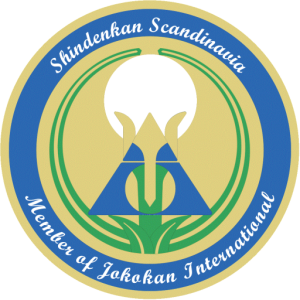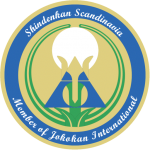By Karsten Nielsen, Member until 2016
It had become Friday 18 May and time for Shindenkan's Hsingi course. I had been looking forward to this course ever since I got the invitation, in fact since I heard about Hsingi. Like Martin Renshi and Mike, I had agreed to drive with Claus Shishu in there. When I sat on the bus from Korsør and looked out the window at the lovely weather, it was as if time stood still and before I knew it, I was in Slagelse. When I jumped off the bus I discovered that I was there 45 minutes earlier than planned. Okay, I had taken a bus too early, but what do you do when you are loaded with coffee mugs and the Karate bag is hanging over your shoulder. The sun was shining and I felt great. Besides, I'd rather be too early than too late for it.
On the way to Måløv, Mike asked me what I expected from the course. I said that the only thing I expected from the course was that it would be good - just like the other courses in Shindenkan. In addition, I would be open to learning. We arrived in good time so that we could properly say hello to the other Shindenkaners.
After we warmed up, Kimu Sensei told us that there wouldn't be much theory today, but that there would be something a little later. In addition, he explained that Hsingi placed a lot of emphasis on speed, precision and power in particular. This was repeated a few times during the training.
Kimu Sensei then started to teach us different ways of hitting. These are some different techniques that are in our curriculum. In addition, he reviewed and explained techniques that dealt with balance breaking, as well as certain points on the body where one is sore or can more easily break an opponent's balance. This we were allowed to train together two by two. When we had tried it on each other, we switched partners. This was super good, because you have to adjust to the new partner's height, for example. When we had practiced, we had to continue in the same style, "just" as in ippon kumite, where there is an attack, then a defense and a counterattack, against one of the points. It turned out to be a really good training because you had to have a plan for how to move yourself and at the same time impress the opponent, so that there was an opening for one of the points.
This required mainly two things. First, it required having a battle tactic that you planned and then executed. Secondly, it required that you take responsibility for the tactics you now had, your opponent and yourself. During this part of the training it succeeded sometimes, but far from every time, and I got to thinking about what it would be like if two came at once, or if the pace was 110 %, or... And what happened then? Yes, I did not focus on the task, which was to create a tactic and take responsibility. Instead, I let thoughts take over, rather than action.
After this exercise, we were divided into new groups of 5-6 in each. One person would now stand in the middle while the others would attack with one tsuki (blow) each, in order. The person in the middle then had to defend against the blows and a new one could come to the center. When the person in the middle had finished, we had to evaluate how it had gone. Here another essential word came into play. A word that is important in all contexts, both inside and outside the Dojo - namely attitude. To make a long story short, I have to admit that it hurt the ego a bit to realize that I had spent 2 hours on something that will be there long before I approach the Dojo. It actually has to be there all the time. My attitude was far from optimal and my training partners could feel it. It was also what had gone wrong earlier, I started to think what if, instead of, I had the right attitude.
After the course I had somewhat mixed feelings. I was very grateful that the course had taught/reminded me that attitude makes all the difference. It also led to a sadness that I didn't utilize my full potential, because that can only be done with the right attitude, in the now. In the movie "The Matrix" Morpheus says to Neo "There is a difference between knowing the path and walking the path". I can see some truth in that, but it requires the right attitude.
When I thanked Kimu Sensei for a great course, I told him that the course had reminded me of something he had told me earlier. I had to admit that even then he was completely right - as he usually is. After that I told him I would go home and work on the cases. Kimu Sensei then asked me who can decide and change my life? And the answer is simple – it is me.




